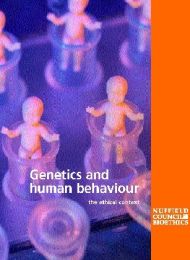Genetics and human behaviour: the ethical context
Report
Published 01/10/2002

Employment
In the future, employers might want to use genetic tests for intelligence or for behavioural traits such as aggression or anxiety, to help choose appropriate employees or to veto unsuitable applicants. Employers currently use a series of tests to assess applicants, including psychometric tests, handwriting tests and IQ tests. Would genetic tests for behaviour lead to unfair discrimination? If a genetic trait might put other people at risk, is it more defensible to test for that trait?
We conclude
Employees should be selected and promoted on the basis of their ability to do a job. Employers should not demand that an individual take a genetic test for a behavioural trait as a condition of employment. Any inquiry into the use of genetic tests in the workplace should also examine the use of other methods, such as psychometric tests.
Education
A wide range of tests are already used to classify children, for example, reading ability, verbal ability and IQ scores. Genetic information about behavioural traits could have a greater impact. Children could be streamed in schools according to their genetic markers, or kept out of classes on the basis of their potential for disruptive behaviour. Should genetic information be used to determine what type of education a child is given? Should genetic tests be used to identify children who have behavioural traits that could affect their own education, or the education of other children?
We conclude
The implications for education have not yet received much attention. The issue needs further research and discussion, and until this has been undertaken, genetic information about behavioural traits should not be used in the context of education.
Insurance
Insurers might wish to use genetic information about behaviour and personality traits, such as aggression or novelty-seeking, in order to estimate risk. However, there are concerns that vulnerable groups may be excluded from obtaining insurance. So far, discussion about the use of genetic information by insurers has not considered the use of information about behavioural traits and this should be encouraged.
We conclude
Genetic information about behavioural traits in the normal range should be interpreted as falling under the scope of the current moratorium in the UK and should therefore not be used by insurance companies in setting premiums. If genetic information is going to be used, it is essential that the tests are accurate and reliable.
The impact on the criminal justice system
There are three ways that information about genetic influences on behaviour could be used in the criminal justice system:
As an excuse
Our legal system is based on the idea of personal responsibility. A person is answerable for their actions and so can be held legally responsible for a crime. There are some exceptions to this, for example, a person with a mental disorder may be said to have diminished responsibility and so may not be held responsible for their behaviour. Should genetic information about a behavioural trait be used to explain a crime, or even to excuse the offender?
The report discusses whether behavioural genetics affects our notion of free will. It has been argued that if genes influence behaviour and character, and we cannot choose our genes, then our behaviour is outside our control and we are not responsible. However, we take the view that genes are not deterministic, and that there is scope for an explanation of human behaviour that allows for genes to have some influence over our characteristics but also holds that we are responsible for our actions.
We conclude
We conclude that genetic information about behaviours within the normal range does not absolve an individual from responsibility for an offence. Research in behavioural genetics does not pose a fundamental challenge to our notions of responsibility.
When sentencing
Should genetic information affect the way in which we sentence convicted offenders? Judges already use additional information about offenders to help decide what sentence to give, including the offender’s previous criminal record, the extent to which the crime was premeditated, and any mitigating, or explanatory, factors. These can include information about environmental influences, such as poverty or an abusive childhood, which may affect the likelihood of criminal behaviour.
We conclude
Genetic information could be taken into account by judges when sentencing. If the information is to be used in this way, it is vital that the genetic link is convincing, and that the tests are accurate and reliable.
Prediction
It is unlikely that genetic information will be accurate enough to justify using it on its own to predict antisocial behaviour. However, when combined with environmental information it might allow more accurate predictions to be made. This information could be used in two ways: to detain someone as a precaution, or to target an intervention to help someone.
We conclude
Where a person has not yet been convicted of a crime, neither genetic nor non-genetic information should be used to predict future behaviour with a view to detaining an individual.
However, if information could be used for the benefit of the individual, for example, as a reason for improving particular environmental conditions, this may be justified. We recommend that genetic information should not be used in isolation in such cases.

Share